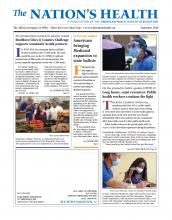If the U.S. adopted global guidelines for air pollution, the lives of 143,000 older adults could be saved over one decade, a recent study finds.
“Our study is among the most rigorous studies that indicate the current national standards are not protecting at least the older population of the United States,” Xiao Wu, MS, lead author of the study and a PhD candidate at the Harvard T.H. Chan School of Public Health, told The Nation’s Health.
At the start of the study, which was published in the July issue of Science Advances, researchers wanted to answer one question: How many lives could be saved by reducing U.S. pollution levels to targets set by the World Health Organization? To do so would mean decreasing current U.S. air pollution levels from 12 micrograms per cubic meter, the current standard, to 10 micrograms per cubic meter, the WHO target.
“To lower the standards to align with World Health Organization recommendations would save at least 140,000 lives among older populations,” Wu said. “These are key implementations. The current policies are definitely not protective enough.”
According to the researchers, the study offers the most comprehensive evidence to date of the link between premature death and long-term exposure to fine particulate air pollution, also known as PM 2.5.
The study analyzed data from 2000 to 2016 on 68.5 million Medicare patients, the largest population size to date for a study on air pollution. Study authors found that an annual decrease of 10 micrograms per cubic liter of PM 2.5 pollution would lead to a 6%-7% decrease in mortality risk. PM 2.5 pollution is most commonly linked to power plants, industries and automobiles.
Despite the growing body of evidence linking air pollution to premature deaths, the Environmental Protection Agency announced in April that it would not lower its current standard for particulate matter air pollution. APHA and other public health organizations spoke out against the decision, calling for the agency to set stronger limits to protect public health.
Wu is hopeful that his team’s study validates other research using publicly available data while providing further evidence that air pollution causes premature death. The researchers used multiple statistical methods to organize the data as if it were collected in a randomized study, “which maximizes reproducibility and transparency,” he said.
For more information on the study, visit https://advances.sciencemag.org.
- Copyright The Nation’s Health, American Public Health Association









